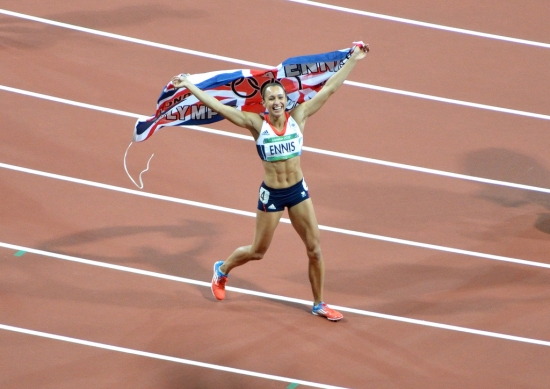It is fair to say that the Olympic and Paralympic Games created something of a stir in Britain earlier this year. As well as London being the home ground for the events for the first time since 1948, Team GB did the country proud by eventually finishing third in the countries table, with 29 gold medals among the 65 strong haul.
Of course, this boosted consumer enthusiasm for sporting goods, causing a spike in sales for some of the most popular high street retailers. And even though JJB Sports entered administration only a few months after the closing ceremony, closest rivals Sports Direct are still celebrating the success of the summer of sport now.

The success of Team GB athletes like Jessica Ennis boosts Sports Direct
In the six months to the 28th October, profits at the successful chain skyrocketed by 24.8 per cent to £125.2 million. This compares favourably to the same period last year when profits reached £100 million, and also breaks all records previously held for the chain.
Revenues also rose astonishingly, peaking at £1.09 billion thanks to a 23 per cent climb.
As a result of the highly impressive first six months of trading, the board have made the decision to increase the group’s long term underlying profit targets. 2014’s goal will be increased from £290 million to £310 million, while the following year is expected to see profits rise to £360 million rather than the originally predicted £340 million.
And, as expected, chief executive Dave Forsey confirmed that Sports Direct is fully on track to meet 2012’s full year targets.
He said; “The first half has been another record period for Sports Direct with the London 2012 Olympics and Paralympics playing a significant part in the group’s strong results.
“There is no doubt that Team GB’s outstanding performance has helped increase the awareness and popularity of sport across the UK, and that we have maintained our position as the consumers’ champion.”
Sports Direct, owned by Newcastle United boss Mike Ashley, now operates 398 stores in the UK after acquiring 20 stores and all stock from collapsed rival JJB Sports earlier this year. It also owns popular sporting brands such as Karrimor, Slazenger and Firetrap, and operates both SportsDirect.com and clothing chain Lillywhites.
With the collapse of its closest rival, it seems that there is no stopping the high street domination by Sports Direct, which is one of the few retail chains which appeared to be barely affected by the recession. Consumers continued to make purchases in stores and through the website, meaning that profits have climbed almost continually for several years now.
Certainly, analysts and industry experts are throwing their backing behind the chain, believing that the recent expansion of its property portfolio can only build upon its strength.
Retail analyst Freddie George, of Seymour Price stockbrokers, says; “The company should benefit from recent acquisitions, capacity coming out of the market and a major opportunity to develop internet sales.”
Do you think the relentless expansion of the Sports Direct network will be a key factor in determining the future of the high street, or will it take more than one highly successful chain to draw consumers away from the lure of internet shopping? Is the demise of JJB Sports truly a good thing for Sports Direct, or do you believe an element of healthy competition was one of the main drives behind the staff and management of the sporting retailer?
Previous Post
One in Six Charities Fear Closure in 2013